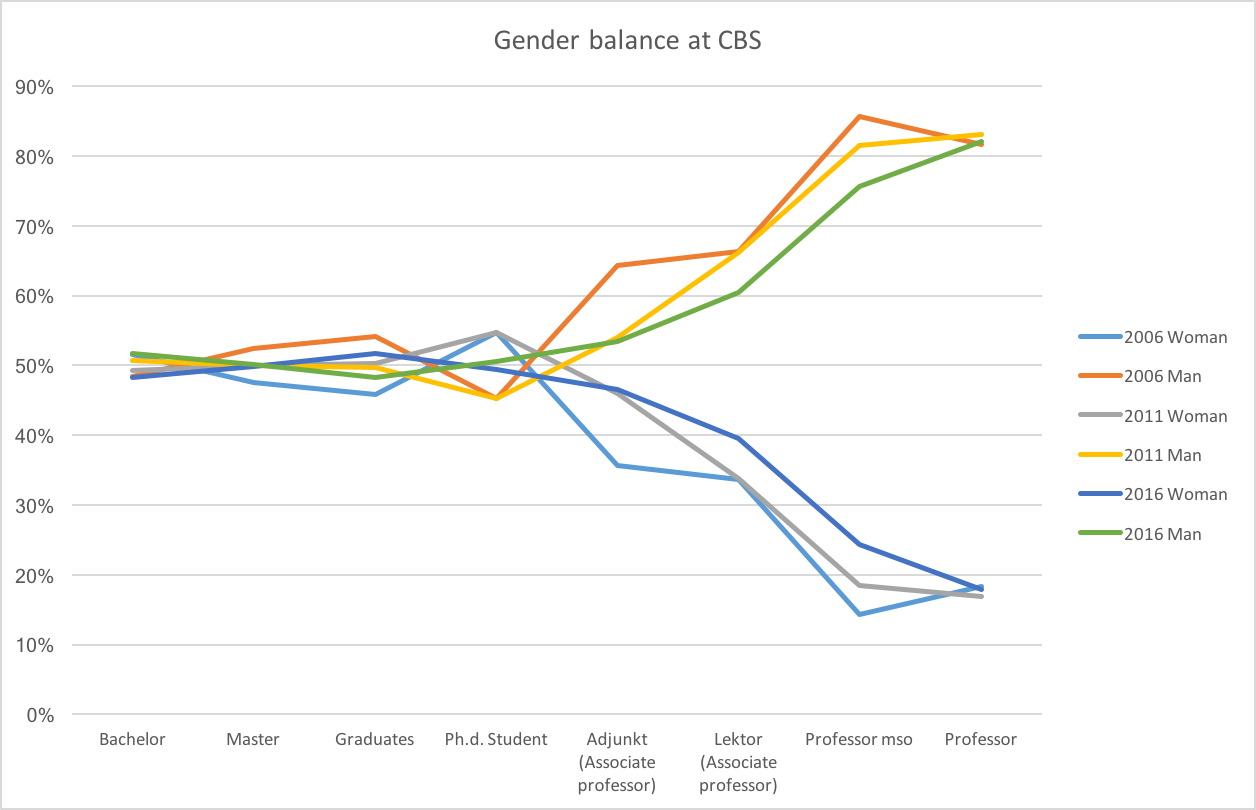CBS and UN come together to get more women in leading positions

CBS is worst in class in terms of gender diversity compared to other Danish universities. Now, the President of CBS is joining a newly establish initiative by the UN Women Nordic Office and The Boston Consulting Group to support more women to take on leading positions, despite not having any set goals for the future.
At CBS’ Centenary Gala Dinner back in March, only one woman out of seven speakers was invited to give a speech – giving a good impression of CBS being a man’s world.
When looking at CBS’ own statistics on gender diversity among faculty it looks bad. If you’re an associate professor or professor up to 82 percent of the professors are men, making CBS one of the most gender imbalanced universities in Denmark and Scandinavia.
”You’re right that we didn’t have an external woman speaking at the Centenary Gala Dinner. If we want to improve, it is in situations like those we have to be extra attentive to how we present ourselves,” says Per Holten-Andersen, President of CBS, who’s now joining the Gender Diversity Roundtable to .
Taking a closer look at the statistics it seems peculiar that the difference is this big.
When the students begin their education it’s a balance of about 50/50, and the gender balance continues in the group of Ph.D. students. At the level of associate professor you will only find about 40 percent women, and it drops to as low as 18 percent when it comes to professorships.

“It’s quite a challenge at the professor level. And nothing has changed through time – not one jot. On the other hand, we haven’t done much to change it until recently. Now it is a focus area, since we cannot afford or accept to lose female talent. However, it’s a development that can take up to 20 – 30 years, unless you go for more radical solutions. Such as gender quotas,” says President of CBS, Per Holten-Andersen and continues:
“We have to wait for a natural turnover among faculty members, but due to budget cuts, we almost haven’t hired any new professors in the last couple of years. There are a lot of qualified women out there, and if they don’t get the leading positions, CBS and the society will lose in the long run,” he says.
The land of the extremes
And Denmark is a loser when it comes to gender diversity in leadership positions in general.
Denmark is, compared to the rest of the Nordic countries, at the bottom, when looking at the number of women in leading positions – whether it be as directors, members of significant boards or as professors.
Furthermore, Denmark is ranked 78 globally in the latest ranking from the World Economic Forum for women in leadership. Denmark also has a very gender segmented work force, which means you typically see female nurses and male policemen.
We have to make this a focus for many years ahead. 20-30 years or so
Per Holten-Andersen, President of CBS
And this is rather ‘extreme’, as Matias Pollmann-Larsen, Project leader at The Boston Consulting Group, puts it.
He is leading the development of a whole new initiative called ‘Gender Diversity Roundtable Denmark’, which aims to focus on the challenges connected to the lack of women in leading positions.
In collaboration with the UN Women Nordic Office, five companies, five universities – including CBS – and five organizations, they seek to find answers to this matter and act within their organizations to hopefully inspire the policy makers to come up with national solutions.
“Organizations have tried to work with initiatives and mainly relied on a generational change. But waiting is not enough. Leaders need to act now and move forward. Diversity (not only gender) is key for managements to perform, and gender diversity can be the real solution in Denmark, as the country isn’t doing so well on this area,” he says.
A lighthouse in the dark
He wants the new initiative to become a beacon in Danish society as the roundtable members represent roughly 2,5 million Danes, stressing that they are not just a talking shop.
“We don’t just meet and talk, I assure you. To begin with, the members share data and discuss what initiatives work and which ones doesn’t. What things can organizations start doing tomorrow? Eventually we want to facilitate members to come up with a list of concrete initiatives to implement in their own organizations, and inspire others to do the same in Denmark,” he says.
Concrete initiatives
When CBS was invited to be a part of the roundtable, Per Holten-Andersen immediately said yes.
He explains that gender diversity is on his agenda, and CBS wants to engage with other universities and companies to learn from one another, as it is a difficult issue to work with alone.
“We have to make this a focus for many years ahead. 20-30 years or so. It takes time to change a culture and rebalance a work force. It’s not only men retiring, it’s also women. And we can’t have a policy dictating only to hire women,” says Per Holten-Andersen.
So, what can be done at CBS, to encourage women to apply for the professorships?
Per Holten-Andersen mentions that several things (see factbox) have been set in motion to make it easier to find out what it takes to become a professor. A process that hasn’t always been without complications to figure out.
“We know there are a lot of well-qualified women out there. And by making it more transparent what we are looking for and what it takes to hold a professorship, we hope that more qualified women will apply,” he says.
Aims instead of goals
It is one thing to have the ambition to get more women to apply for leading positions. Another thing is goals.
Working with goals can seem like an easy way to hold one to one’s word, but in this case, both Per Holten-Andersen and Matias Pollmann-Larsen disagree on having set goals, such as gender quotas and time frames.
“CBS doesn’t have a set time by which we should reach a 50/50 gender balance. But our aim is to change the imbalance graduately. We have been discussing quotas in the Council for Diversity at CBS, and we have agreed it’s not a good idea because it polarizes the debate. We must address the societal and organizational culture and thus initiatives must appeal to the motivation and enegagement of the decision makers,” says Per Holten-Andersen.
No gender quotas
Matias Pollmann-Larsen argues that the companies, organizations and educational institutions didn’t sign up for this initiative in order to end up with one set of goals that applies for all.
Instead, it’s about trying to understand what could work in their own organizations, and take action that changes the dynamics of how to retain and promote women to leadership positions. And in this sense quotas are not the answer, he argues.
Cultural norms and behaviors has great impact on what women and men choose when it comes to university and higher education
Matias Pollmann-Larsen, The Boston Consulting Group
“Quotas are difficult to work with because women are the first to say they don’t want them. Nobody wants others to think that they gained a certain position because of a quota rule, but because of their talent. We have to go deeper and move this more systematically, so that more women and men come through, because we change how we manage retention and career planning,” he says.
By doing so he explains that we would have a bigger crowd in which to promote and develop talent – and it has to start during the educational years.
“If I usually find my future employees and leaders from one study line, and the share between men and women is 80/20, then it’s obvious I can’t expect to have a gender-divers management. We need to act across the entire pipeline, and find answers to questions like how to ensure more balanced gender balance in leader-prone study lines as they form the leaders of tomorrow,” he says.
So, wouldn’t gender quotas be a perfect solution on a study level?
“Employers would love to be able to source talent from a gender balanced graduate pool, but cultural norms and behaviors has great impact on what women and men choose when it comes to university and higher education. And this cannot be dealt with if you use quotas, but other concrete initiatives to strengthen career planning and recruiting activities can attract minority genders,” he says.
The first meeting in the Gender Diversity Roundtable is to take place Wednesday 21st June, and the last meeting is planned sometime in the spring of next year. By then CBS WIRE will contact Matias Pollmann-Larsen and Per Holten-Andersen again to ask, what they got out of it.

































































































































Comments